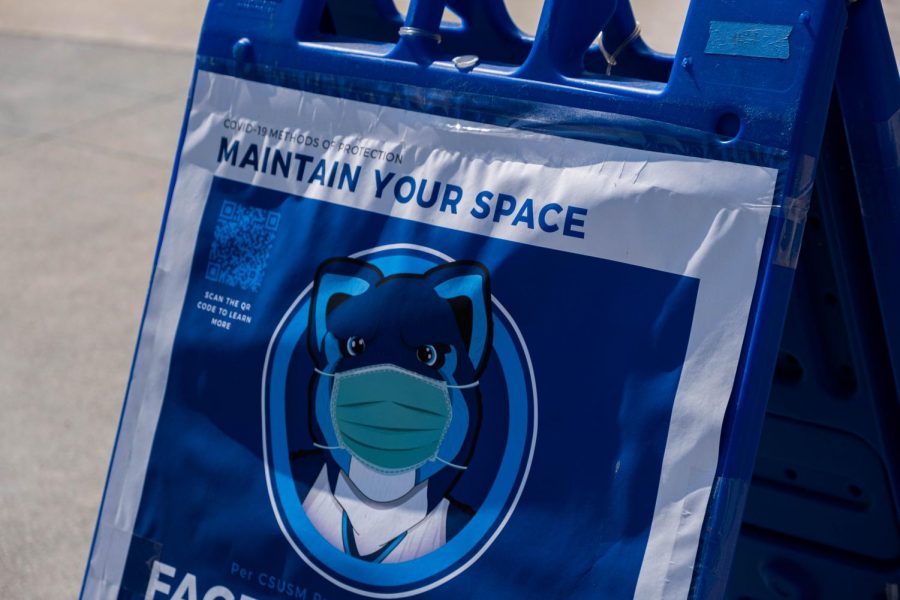Staff working on campus experience new guidelines and challenges
Signs at CSUSM remind people to stay a safe distance apart, one of many measures intended to keep faculty, students and staff healthy.
October 25, 2020
Even as campus remains closed for all except essential operations, non-faculty staff are still working to support students and faculty taking and teaching classes in person.
CSUSM currently employs 830 non-faculty staff, a reduction of 30 from the 860 non-faculty staff they employed in March.
655 out of the 830 staff and administrators currently work remotely. The other 175 staff work on campus.
Chief Communication Officer Margaret Chantung said that university safety protocol guides the 175 staff working on campus.
The Return to Campus Training Program provides guidelines about face masks, personal protective equipment (PPE) and social distancing for all staff working on campus to follow.
Whenever possible, remote work is preferred for staff. If that is not possible, there is a rotating shift schedule to minimize the number of people on campus at any given time.
For those still working on campus, there are many obstacles that they face. Facilities Services Director Floyd Dudley said in an email to The Cougar Chronicle that he and his peers have had to remain flexible due to the shifting workload and that they are experiencing concerns due to the virus.
“Given COVID-19, there naturally are concerns amongst staff and managers related to working on campus,” Dudley wrote. “Some staff are immunocompromised or live with or care for individuals who are. Others need support and flexibility related to caring for children at home due to school closures.”
Dudley said this is the reason why it was important for everyone to follow the safety guidelines to reduce the danger of working in person.
According to Jenna Dahlin, the Unit 2 representative of the CSUSM chapter of the California State University Employees Union (CSUEU), staff expressed fears that campus’ policies do not reflect current information on the virus.
“Staff is concerned about the doing away with daily temperate checks in certain departments. In addition, since our understanding of COVID-19 is evolving, fears that the campus’s policies don’t reflect most current information has been expressed,” Dahlin wrote in an email to The Cougar Chronicle.
The CSUSM website describes the multiple ways in which measures are implemented to prevent infection, including social distancing, plexiglass partitions and wearing masks and other PPE.
The university offers several resources to help spread information about COVID-19. The “CSUSM as One” webpage has been created to give easy access to reporting tools or getting information.
Near the start of the pandemic, CSUs implemented administrative leave for COVID-19. Dependent on circumstances, employees can receive this specific COVID-19 Paid Administrative Leave (CPAL).
Since March, CPAL offers up to 256 hours of paid administrative leave that is to be used by the end of the year. It can be used if the employee or a family member is sick with COVID, if the employee is directed by their supervisor to not work due to COVID-related reasons, or if there is a COVID-19 childcare issue.
Staff are also offered more paid sick leave and medical leave.
The Families First Coronavirus Response provides paid sick and medical leave. The Emergency Paid Sick Leave Act provides two weeks of paid sick leave for staff in quarantine or taking care of someone in quarantine. It is also provided for those with COVID-19 symptoms and needing childcare. The Emergency Family and Medical Leave Expansion Act also adds up to twelve weeks of medical leave.
The CSUSM chapter president for CSUEU, Vanessa Vincent, wants all staff voices to be heard.
When a concern is brought up, CSUEU brings it immediately to higher leadership and Human Resources to come up with solutions.
Vincent expressed her thanks for all staff working on campus during this time and in reference to them, said “You are all truly heroes during these times.”
As it is likely that pandemic provisions will continue, and as next semester will be mainly virtual, non-faculty staff will still face worries and challenges over COVID-19.


